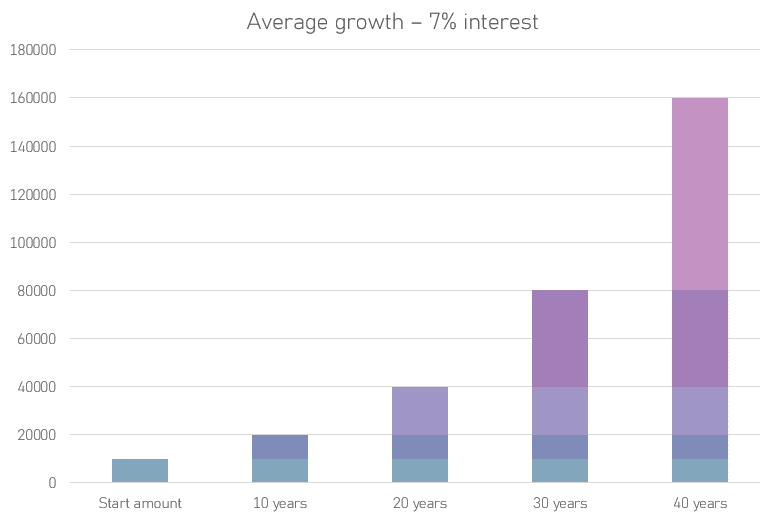Is investing something you think you’ll “worry about later?”
Which of the following describes you best:
- I have a plan for retirement and I am on track to retire comfortably with enough money for my desired lifestyle.
- I know what I should be doing to prepare for retirement but I haven’t done much yet because retirement is so far off.
- Isn’t that what Social Security is there for?
- I’m planning to work till I’m 100, no biggie.
If you answered (1.), give yourself a big pat on the back and go read about stocking up on personalized Chanukah gifts and 9×13 chicken marsala recipes. If, as I’m guessing, you checked off one of the other answers, read on and thank me later.
Like you, I was once clueless about long-term financial planning. I didn’t understand investing, had no idea how to get started, and besides, who has extra money for stuff like that? As for retirement, it seemed like no one else was worried about it, so I put that into the “worry about later” category in my brain and left it there.
Big mistake. Because this is definitely one area where it turns out that what you don’t know, actually can hurt you. Or, at least, cause you to miss out on a whole lot of benefits that could have been yours, with a lot less effort – and money – than you thought.
Eventually, I set out to educate myself. I read books, searched online, listened to podcasts… I ended up inspired to take action, but drowning under a deluge of TMI – and still no clue how to move forward productively. I set out to distill the basic information I needed to actually take control of my future.
Here’s what I learned:
- Investing works on the principle of compounded interest. This means the more years your money is invested, the more it increases exponentially. In fact, it is not uncommon for investments to double every 7-10 years – so, starting now instead of waiting, say, 10 or 15 years, could dramatically increase (or more than double!) your income at retirement
- Investment does carry a risk, but that risk can be greatly reduced by diversifying your funds across many successful companies. Investing in a mutual fund indexed to the S&P 500 is a time-tested method to steadily grow long-term investments.
- Social security is not intended to be a full retirement income and currently provides a minimal-to-moderate income depending on lifetime earnings – not necessarily an amount that most of us would like to live on. Furthermore, this amount could be reduced in the future, especially for today’s younger workers
Wow. Don’t you wish you had learned all THIS stuff in school, instead of, say, graphing cosines and calculating the atomic weight of Plutonium? The good news is, investing does not require meeting with a stock broker or starting with thousands of dollars. It also does not require a vast amount of knowledge about the stock market, or frequent tracking and trading. Wondering how to get started? Glad you asked!
First step is to check with your employer to see if they have a 401K plan (403B for non-profit organizations like schools). This is a simple plan to automatically invest a percentage of your pre-tax income into a retirement fund – no further work required on your part.
Some employers have a match policy, and will match your 401K contribution up to a certain percent of your salary. For example, in a company that matches 50% of your contribution, for every $100 you contribute to your 401K, your employer will contribute an additional $50. If you are fortunate enough to have this opportunity, grab it for the maximum allowed – never leave free money on the table!
In addition, you also have the opportunity to contribute to an IRA at an online investment website like Fidelity.com, Vanguard.com, or Charlesschwab.com. This is an independent retirement investment account, which is tax-free either at the time of contribution (Traditional IRA) or at the time of retirement (Roth IRA). This will require some additional steps on your part, to select an investment fund and automate your investments.

Assuming an average 7% rate of return, your investment would double approximately every 10 years (even without adding any additional contributions). Based on past performance; results are not guaranteed. Consult a finance professional for details.
Feel like you can’t afford to put away money now? You might want to consult with a financial advisor to see how you can budget responsibly to invest for your future. At any rate, start slowly and consistently, and remember that even small amounts can grow exponentially in the long term.
The world of investing can seem complicated and confusing. It’s important to educate yourself, but by getting started with the basics right now you can be well on your way to growing your money for the future. For more depth of understanding, check out these resources:
- Livingsmarterjewish.org – education and counseling
- JewishLatinPrincess.com – by Yael Trusch – Financial advice
- Nerdwallet.com – select topics under GUIDES & TIPS
- Jewish Money Matters podcast – by Yael Trusch – Finance
- Kosher Money podcast – Finance
- I Will Teach You to Be Rich book
- The Automatic Millionaire book




Great Website for all references
Simple guide for jewish household
https://geltguide.com/
Thanks!